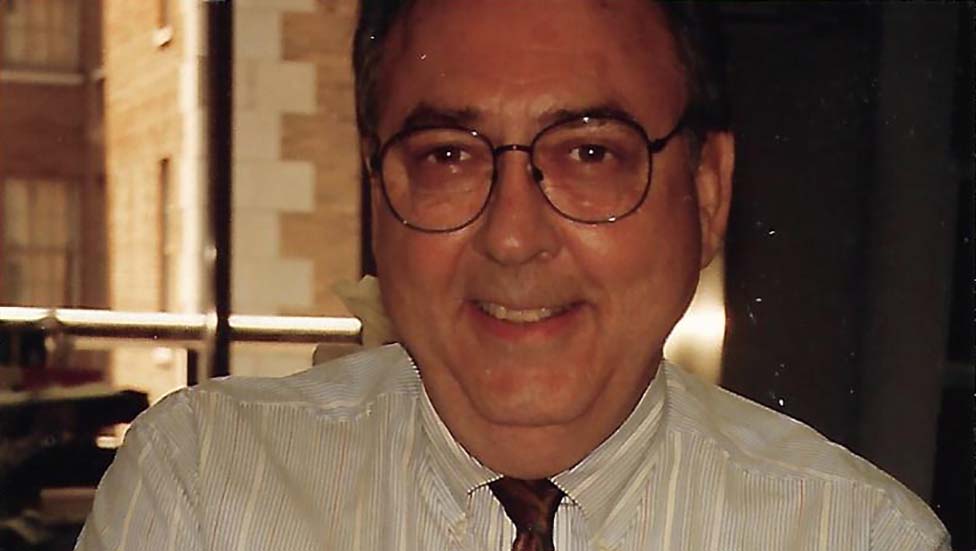Former ‘B+C’ Editor Don West Dead at 94
Managed magazine through sea changes in business and communications

The smarter way to stay on top of broadcasting and cable industry. Sign up below
You are now subscribed
Your newsletter sign-up was successful
Donald V. West, 94, former top editor of Broadcasting+Cable (formerly Broadcasting magazine), died February 4 at The Jefferson retirement community in Arlington, Virgina.
West took over as top editor of then-Broadcasting magazine in 1982 upon the death of magazine co-founder Sol Taishoff and led the magazine through design and name changes, as well as various enterprises including newsletters, international editions, and convention dailies. He was also editor of the Broadcasting & Cable Yearbook and principal editorial writer.
Born in Texas and raised in New Mexico, West’s first brush with electronic communications was running a recording studio as a teenager. He became, successively, a radio transmitter engineer, managing editor of a small-town daily newspaper — the Roswell (New Mexico) Record — and as wire editor of the El Paso (Texas) Times, before serving as an artillery sergeant in the Korean War.
Also Read: ‘B+C’ Marks a Milestone
A graduate of New Mexico A&M College, West came to Washington with an eye on law school but a heart still in journalism.
He joined Broadcasting’s then-Washington headquarters in 1953, transferring to the New York bureau in 1958 as manager.
When Broadcasting bought the monthly Television magazine in 1960, West was named managing editor and VP.
The smarter way to stay on top of broadcasting and cable industry. Sign up below
In 1966, he joined CBS as assistant to network president Frank Stanton, rejoining Broadcasting in 1971 as managing editor, again based in Washington.
The banner on the editorial page once read ”Committed to the First Amendment and the Fifth Estate,“ and the same could be said of West.
In his editorials, as well as speeches, writing and appearances at industry events, he carried on the fight for a broadcast medium as free as print, which meant free from micromanaging by political interests.
While broadcasters, particularly in tough economic times, have been tempted to forego that fight and accept a compromised First Amendment as a quid pro quo for the protection of their business and avoidance of further regulation, West never counseled such expedience and the expense of the speech protection they, and the public, deserved.
West was also instrumental in the creation of the Broadcasting+Cable Hall of Fame.
He exited the magazine in 2001. He joined the board of the Library of American Broadcasting Foundation in 2003 and became president, creating the Giants of Broadcasting & Electronic Arts awards. In 2015, West was honored as one of those giants.
His bio for the award notes that as a young Roswell newspaperman, West “was distinguished by missing the biggest story of the century when, as the first reporter at the site of the fabled Roswell alien invasion, he found nothing to report.”’
That could not be said for a 40-plus year career covering electronic communications that earned him plaudits from some other giants of the business.
“Don was a force in the industry in his own right and a tireless advocate for full First Amendment Rights for broadcasters,” Preston Padden, a former top News Corp. and The Walt Disney Co. executive and one-time head of the Association of Independent Television Stations (INTV) in Washington, said.
“It’s hard for folks today to comprehend how influential Broadcasting was under Don back in the day,” C-SPAN CEO Susan Swain said.
“I first met Don West during my FCC days and, thereafter, we had many wonderful lunches and discussions about broadcasting-related issues,“ former Federal Communications Commission chair Dick Wiley said. “Don was a terrific journalist who knew the broadcast industry — and everyone in it — from top to bottom. He was also a great advocate for applying First Amendment rights to the electronic media, a cause he supported during his entire career. He was one of the very best. RIP.”
In 1992, top executives in the communications business weighed in on West's impact on the industry.
“Few men or women in the broadcast and editorial world have had such a profound and lasting impact on the world of communications,” Jack Valenti, then-president of the Motion Picture Association of America, said. “He has oftentimes shaped the agenda for public leaders, and more than often clarified opaque, complicated issues for those who want to understand what the future may hold.”
“Don is the consummate professional and one of the best editors in the business,” said Robert Daly, then-chairman of Warner Bros.
“As editor of Broadcasting Magazine, [West] has shown insight and vision in his objective coverage of the emergence and development of the cable television industry,” wrote CNN and Turner Broadcasting System founder Ted Turner. “He has proved himself to be a true leader among journalists.”
“In my 50 years of working with editors of industry publications, none has come close to Don West for sheer knowledge of the business, for integrity, for leadership, and for style,” Stanton, the former CBS president, wrote in 1992. “Except for a brief interval during which he was my assistant at CBS, West’s life belonged to Broadcasting, the magazine, and broadcasting, the communications phenomenon of the century.”
A Celebration of Life is planned at a date to be determined.
Contributing editor John Eggerton has been an editor and/or writer on media regulation, legislation and policy for over four decades, including covering the FCC, FTC, Congress, the major media trade associations, and the federal courts. In addition to Multichannel News and Broadcasting + Cable, his work has appeared in Radio World, TV Technology, TV Fax, This Week in Consumer Electronics, Variety and the Encyclopedia Britannica.

